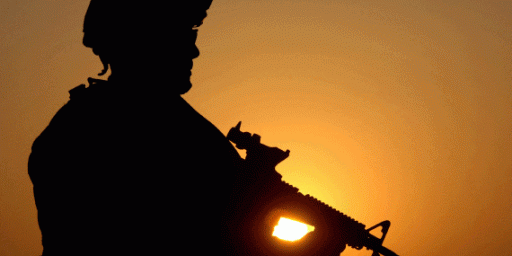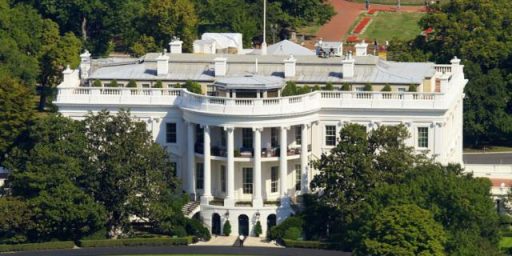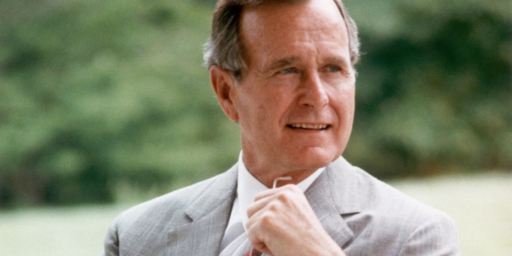Bush on Nation Building
In a sidebar on the Iraq War casualty predictions post, regular commenter Odograph observes, “I think ‘Bush was famously against nation-building’ is a retroactive political claim.”
Not at all. While it’s hard to imagine in hindsight, Candidate Bush ran against nation building and promised a “more humble foreign policy.”
Remember, Realist Condi Rice was his chief foreign policy advisor during the campaign and he appointed Realist Colin Powell as his first Secretary of State. The events of 9/11 changed his mindset considerably and his policy was shaped by Neoconservatives for a few years before quietly shifting back to a more conventional Realist policy agenda toward the end of his administration.
A website called zFacts rounded up several relevant Candidate Bush quotes. I’ve reformatted them in cleaner fashion below:
- “Let me tell you what else I’m worried about: I’m worried about an opponent who uses nation building and the military in the same sentence. See, our view of the military is for our military to be properly prepared to fight and win war and, therefore, prevent war from happening in the first place.” – Nov 6, 2000
- “Somalia. It started off as a humanitarian mission then changed into a nation-building mission and that’s where the mission went wrong. The mission was changed. And as a result, our nation paid a price, and so I don’t think our troops ought to be used for what’s called nation building. I think our troops ought to be used to fight and win war. I think our troops ought to be used to help overthrow a dictator when it’s in our best interests. But in this case, it was a nation-building exercise. And same with Haiti. I wouldn’t have supported either.” – Oct. 11, 2000
- “I think what we need to do is convince people who live in the lands they live in to build the nations. Maybe I’m missing something here. I mean we’re going to have kind of a nation-building corps from America. Absolutely not. Our military is meant to fight and win war. That’s what it’s meant to do and when it gets overextended, morale drops.” – Oct. 11, 2000
- “I think we’ve got to be very careful when we commit our troops. The vice president and I have a disagreement about the use of troops. He believes in national building. I would be very careful about using our troops as nation builders.” Oct. 4, 2000
The above video, obviously redacted, is amusing in hindsight. But that’s who Candidate Bush was. I believe that this was his honest and sincere intention for conducting foreign policy. But, like most presidents — including the current one — things look a little different from the Oval Office.






I apologize if this sounds too nitpicky and nuanced, but doesn’t that really overstate the case? I would agree that President Bush was strongly influenced by Neoconservatives during that period, but do you really believe he was “controlled” by them?
Was Bush considered a RINO for talking like this, or were these the views of the GOP writ large?
In other words, what’s the headline at the imaginary 2000 version of Hot Air the morning after this debate?
Fair enough. What I mean is that “Bush foreign policy decision-making was dominated by neoconservatives.” I’ll clean it up a bit above to clarify.
There was a group of National Greatness Republicans even then but I think Bush was speaking for the consensus. Remember, most of us thought just about all the Clinton interventions were ill advised.
In reality, the ‘realists’ were not all that realistic. They were forced to change their tune when faced with the post 9/11 world. That change made it much easier to predict as I did that Obama similarly be abandoning his unrealistic campaign rethoric in fravor of the post 9/11 Bush policies.
And yet you use this “bush was famously against nation building” part of the campaign as a reason for thinking we wouldn’t nation build in Iraq, despite doing precisely that in Afghanistan for a year and a half leading up the Iraq war.
I pointed out at the time that Bush, like his father, was at best a centrist.
IR theorists of all stripes with any credibility in the American discourse believe in responding to direct attacks with force. Bush chided Clinton for “lobbing a few missiles” at bin Laden’s “tents” as I recall.
I think most of us understood that at the time. But that was in reference to his domestic agenda, not his national security policy, which was mainstream Republican.
Thanks for the call-out, but I think the “humble foreign policy” was one without wars in the first place.
In that video he says he doesn’t want to go around the world, and “walk into countries and say do it this way.”
Painful video. Either he was outright lying or he totally changed going into Iraq, but that “change” doesn’t fit the facts. We know they had plans for Iraq pre-9/11, and as soon as 9/11 they were all “how can we use this to get into Iraq?”
So he did, and so did I. It always seemed to me a half-hearted effort at best which didn’t really serve any purpose.
I yeild to that point. Still, I was of the opinion then and still today, that the compartmentalization was not quite so complete as all that. Given basic the philosophy of the man there had to be some overspill into non-domestic areas. Certainly, the rather Obama-like approach to FP in the Bush campiagn as you cite, would be indicative of that.
I think 9-11 certainly did change a lot of Bush’s foreign policy philosophies. And I think that while some thought Bush was a bit soft with his compassionate conservatism the GOP at the time was pretty anti nation building-one would only need to consider the GOP response to Kosovo (which is still pretty much a failure) and Bosnia when Clinton got involved with those.
I think it is rather easy to be a presidential and criticize the current presidency on a variety of issues and say how your ideas are better and will be implemented, then you get into office and the realities of being there change a lot.
I remember Bill Clinton had a very different policy idea towards China as a candidate than he did as president, and Obama has done a nice job of showing this as well.
Being the candidate means making decisions that have no consequences, being the guy in the oval office changes everything.
Bush planned Iraq invasion before 9/11:
James, I’m going to choose that you are an honest guy, not trying to lie to me, but just suffering from a little dissonance.
We have invasion plans for every country in the world, constantly updated at all times, Odo. You did know that, right?
I know that the pentagon draws up invasion plans all the time, numbers them and files them.
I do not believe the Whitehouse actively engages, picks one as their strategy all that often (thank God!).
I opposed the invasion of Iraq until very late in the game, ultimately falling for the WMD argument after North Korea went nuclear and I realized the dangers of waiting.
That said, there was a Realist argument to be made for taking out Saddam. Even Bill Clinton said “regime change” was American policy toward Iraq.
Going in and taking out unfriendly governments might not be “humble” in any ordinary sense of the word but putting in, say, Chalabi and then letting elections take their course would fit a superpower’s definition.
I listen to this and hear a pointed criticism towards a form of liberal internationalism in which American troops are used to halt the coming anarchy of collapsing states in places like Haiti, Somalia and the Balkans. I don’t recall the U.S. doing that in the Bush administration.
There is certainly overlap between liberal internationalism and neoconservatism, but I suspect the main reason we are engaged in nation building in Iraq and Afghanistan is the result of strategic choices that had many lineages.
James, I hope you understand that I was talking “dissonance” about your recall of Bush’s Iraq, and not your strategic analysis.
If we are going to speak of ourselves though: I was cautious about Afghanistan for practical reasons (the British and Russian experiences with occupation), but gave it a clean moral call. I gave Iraq considered Iraq doubly flawed, on both practical and moral grounds. (By morality there I primarily mean our own domestic morality, the importance of truth in a democracy in time of possible war.)
I think my views held up very well.
Shorter: Bush corrupted our own democracy even as he claimed to build another.
(The “Downing Street memos” have now been acknowledged correct by several players.)
I believe it too, to some degree. After all, just read Condi Rice’s essay in Foreign Policy in 2000 – it’s basically a sum of realist thinking and skepticism on nation-building.
That’s mostly because the international situation doesn’t require such activity as it did in this case.
I’d argue that Afghanistan qualifies under that wording.
I recall Candidate Bush’s opposition to nation building, but I always considered that a critical response to Clinton’s interventions in Bosnia as opposed to a principled stand against nation-building.
I also recall that Candidate Bush had a strange fascination with Iraq during the ’00 campaign and it seemed clear to me that if he were elected, he was going to do something about Saddam Hussein. He probably had sanctions in mind rather than invasion, but Iraq was definitely on his radar even before the Supreme Court saw the first Bush V Gore brief.
Wow, how soon everyone forgets this stuff. I remember it like it was yesterday. The activist right was really against the interventions in Haiti and Bosnia, and you even heard “wag the dog” talk about the bombing of Iraq in 1998. I hasten to add that most Republican senators went along with the actions in Bosnia and Iraq, though some more grudgingly than others, perhaps because they tend to be more plugged into the defense establishment than the grass roots right.
Anyway, Bush’s main military arguments were that our readiness was in the crapper, and that we needed to avoid “nation building”. Condoleeza Rice, the foreign policy advisor to the Bush campaign, was a protege of Brent Scowcroft and was generally associated with the ‘realist’ thinking Scowcroft still hews to, but the Bush administration gave up after 9/11.
(regarding PNAC, plans to invade Iraq from before 9/11): Who knows if Bush always intended an aggressive, anticipatory strategic posture? Maybe he did; the point is that he ran for president as a cautious foreign-policy realist, and that’s what people voted for.
And that’s why “fixing the intelligence” was necessary.
You know, we have heard from a lot of “people in the room” by now. Just the same we all (even moderate and liberal) are slow to accept what happened – because it’s painful – because it does not fit our self-image of America.